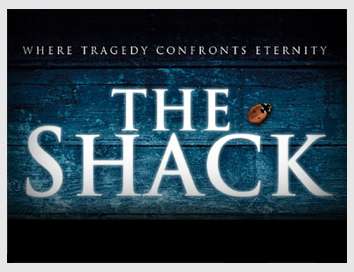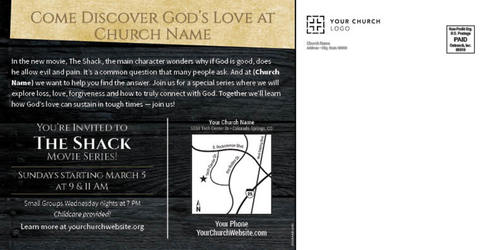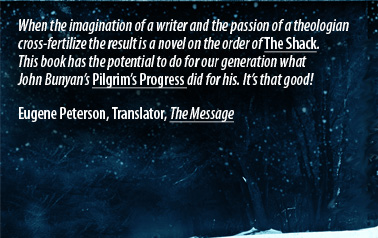“non-christian view…
“My name is Aram and I just finished reading The Shack. I then went online and happened across a bunch of people arguing about it, for what looks like a few years now. People are calling this a heresy, a dangerous book, and warning people not to read it.
“Why?
“I normally never comment on these things, but being an unbeliever
“– yes that’s right, I am not a Christian –
“I thought it might be useful for some of these theology spouting authorities to take a moment and look at what I, not a churchgoer in any way, have gleaned from this little book.
“And then ask yourself – because I really don’t know much about the Bible – is anything I learned leading me in the wrong direction?
“Perhaps all the way to this burning lake of fire so many Christians love trying to scare non-Christians with?
“If this is the case, then I guess you’re right, and based on what you believe people shouldn’t read this book.
“For me, I don’t believe fear and rules to be the answer, I never have.
“This has been the main reason for my avoidance of the church.
“However, when you preach love and forgiveness, through whatever means conveys it the best, whether fiction or otherwise, well now, my heart begins to open a tad.” [There’s a problem here, spiritually and philosophically, and in every other way…. why do you need forgiveness and love if there are no rules? Doesn’t there even have to be a sense of love is the right way to go in order for there to be an expectation that there should be love?]
“It makes me actually want to pick up a Bible perhaps and maybe read a little further.
“Teach love my believer friends, because people like me, we don’t respond well to fear tactics.
“And we definitely don’t get turned on by arrogant church leaders who think they have it all figured out.
“Below are 57 new ideas I took away from this little book. Many are direct quotes from the book itself.” [I’m going to spare us all the quotation marks for the 57 ideas.]
1. The different appearances of ELoHiYM, YaHuWShu’A and the RuWaCx HaQoDeSh that were used to help Mack break his religious conditioning.
2. You don’t get brownie points for doing something through obligation; only if you want to do what you’re doing.
3. Life takes a lot of time and a lot of relationship.
4. How free are we really? – family genetics, social influences, personal habits, advertising, propaganda & paradigms etc. Freedom is an incremental process that happens inside a relationship with YaHuWShu’A HaMaShiYaCx.
5. When all you can see is your pain, perhaps then you lose sight of YHWH.
6. Pain has a way of clipping our wings, so we can’t fly. After awhile we forget we were ever created to fly.
7. When YaHuWShu’A became a man he gave up his own ability to heal people and do miracles. His miracles were accomplished by the trust of YaHuWShu’A (a man, a dependent limited human being) in His Father YHWH. We are all designed to live like that, out of YHWH’s life and power.
8. YHWH exists in three persons so we, His creation, can also live in love and relationship, just like YHWH does. If YHWH didn’t, we couldn’t. “YHWH cannot act apart from love.”
9. Relationships are never about power, and one way to avoid wanting power is to limit oneself – to serve.
10. Sin is its own punishment, devouring from the inside. It’s not YHWH’s purpose to punish it; it’s YHWH’s joy to cure it.
11. When people choose independence over relationship, we become a danger to each other.
12. If people learned to regard each other’s concerns as significant as their own, there would be no need for hierarchy. YHWH does not relate inside a hierarchy; YHWH wants us to trust him because He will never use or hurt us.
13. When Christians don’t trust YHWH it’s because they don’t know they are loved by him. They think YHWH is not good.
14. Mack [one of the characters] says: “I just can’t imagine any final outcome that would justify all this (pain, suffering etc).” Papa [another character] replies: “We’re not justifying it. We are redeeming it.”
15. The choice of YHWH to hide so many wonders from man is an act of love that is a gift inside the process of life.
16. For any created being, autonomy is lunacy.
17. When something happens to us, how do we determine whether it is good or bad? By whether we like it or if it causes us pain. This is self-serving and self-centered.
18. We become the judge of good and evil; so when each person’s good and evil clashes with someone else’s, fights, even wars, break out. [That’s what I saw happen on Facebook.]
19. Eating of the tree tore the universe apart, divorcing the spiritual from the physical. All of us died, expelling the very breath of YHWH.
20. We play ELoHiYM in our independence. The only remedy is to give up the right to decide good and evil and choose to live in YHWH and trust and rest in his goodness.
21. YHWH is light and YHWH is good. Removing ourselves from YHWH will plunge us into darkness. Declaring independence will result in evil because apart from YHWH, you can only draw on yourself. That is death, because you have separated yourself from YHWH, from Life.
22. This concept is difficult for us because the good may be the presence of cancer or the loss of income, or even a life. Sarayu [another character] answers: “Don’t you think we care about these people who suffer too? Each of them is the centre of another story that is untold.”
23. About having ‘rights’: “‘Rights’ are where survivors go so they won’t have to work out relationships.”
24. YaHuWShu’A gave up his rights so his dependent life would open a door that would allow us to live free enough to give up our rights.
25. Each of us is wild, beautiful, and perfectly in process when YHWH is working with a purpose in our hearts. We are an emerging, growing, and [an] alive pattern – a living fractal.
26. We tend to live either in the past or the future; dwelling on the pain and the regret of the past, instead of a quick visit to learn something from it. Or fearing the future, letting our imagination run wild with worry, and forgetting to see the future with YaHuWShu’A. This happens when: a. we don’t really know we’re loved and b. we don’t believe that YHWH is good.
27. Apart from YaHuWShu’A’s life, we cannot submit one to another. YaHuWShu’A’s life is not an example to be copied. YaHuWShu’A came to live his life in us; so we will see with YHWH’s eyes, hear with His ears, love with His heart, and touch with His hands.
28. Some say love grows, but it is the knowing that grows and love simply expands to contain it. Love is the skin of knowing.
29. We human beings are constantly judging others because we are self-centred.
30. We say: “Predators deserve judgment, their parents, too, for twisting them, and their parents, and on and on, until finally we go right back to Adam, and then, why not judge ELoHiYM? He started it all…isn’t ELoHiYM to blame for our losses? He could have not created, or he could have stopped the killer, but he didn’t.” If we can judge ELoHiYM so easily then, of course, we can judge the world. We must then (e.g.) choose two of our five children to go to heaven and three to go to hell, because that’s what we believe ELoHiYM does. Mack could not choose any one of his children because he loved them no matter what they did. So instead, he begged that he could go to hell for his children. This response is exactly what YaHuWShu’A did. Mack judged well. He judged his children worthy of love, even if it cost him everything. This is how YaHuWShu’A loves. ‘And now we know Papa’s heart.”
31. YHWH’s love is so much larger than our sin could ever be.
32. Evil was never a plan of YHWH’s. We must return from our independence, give up being His judge, and know YHWH for who he is.
33. When we receive YHWH’s love and stop judging Him we let go of the guilt and despair that had sucked the colours of life out of everything.
34. YHWH never abandons his children. We are never alone. YHWH could no more abandon us than he could abandon Himself.
35. “Live loved.”
36. When we leave the light of YHWH and retreat to the darkness all alone, the darkness makes our fears, lies, and regrets bigger in the dark. Sometimes, as a kid, doing this is part of survival, but now we must come to the light.
37. YaHuWShu’A will travel any road to find his children. But only one road leads back to heaven.
38. Stories about a person willing to exchange their life for another reveal our need and YHWH’s heart.
39. Even though YHWH can work incredible good out of unspeakable tragedies, it does not mean ELoHiYM caused it. Where there is suffering, you will find favor in many facets and colours.
40. ‘Love’ bothers to keep trying to touch people and never gives up.
41. Sometimes we hide inside lies that justify who we are and what we do.
42. Ask for forgiveness and let the forgiveness heal you. Take the risk of honesty. Belief does not grow in the house of uncertainty.
43. Our transformation is a miracle greater than raising the dead.
44. All evil flows from independence.
45. YHWH’s purposes are always and only an expression of love. YHWH works life out of death, freedom out of brokenness, and light out of darkness.
46. Emotions are neither good nor bad. They are the colours of the soul. They are spectacular and incredible.
47. The more you live in the truth, the more our emotions will help you see clearly.
48. Trying to keep the law is actually a declaration of independence, a way of keeping control. Keeping the law grants us the power to judge others and feel superior. [THIS ONE I WHOLEHEARTEDLY DISAGREE WITH. WE ARE COMMANDED TO KEEP YHWH’S COMMANDMENTS. IN FACT THE RESTORED COVENANT IS THAT HIS COMMANDMENTS ARE WRITTEN ON OUR HEARTS, WHERE WE CAN DO NOTHING BUT KEEP THE COMMANDMENTS, IF WE ARE TRUE TO YHWH AND TO OURSELVES…. this reminds me of another question I saw on Facebook today: “Why do I have to REPENT if ‘G-D’’s love is unconditional?”]
49. Responsibility and expectation are dead nouns, full of judgment, guilt, and shame. Our identity becomes wrapped up in performance. The opposite is when YHWH gives us an ability to respond that is free to love and serve in every situation, with YHWH in us; and expectancy is alive and dynamic with no concrete expectation – only the gift of being together. [YHWH’s word says something far different about those who choose to live outside of a relationship that is based on love = obedience.]
50. To the degree we live with expectations and responsibilities is the degree we fear and the degree we don’t trust or know YHWH. [YHWH is not bound to bless us unless we partake in the everlasting covenant with Him.]
51. If YHWH is the centre of everything, then together we can live through everything that happens to us.
52. Forgiveness is big. [This is true. However, if there is no responsibility and no standard by which expectation can be made, there would be nothing to forgive. There would be no such thing as sin, which of course, is also not what the Word of YHWH says. This premise, which is huge and true, is in contrast with other selfish and self-serving things this nonbeliever has said.]
53. When bad things happen, what YHWH had to offer us in response is His love, goodness, and relationship with us. [However, this does not take what the Word says about the blessings His children would receive for obedience, and the curse they would receive for disobedience (see Lev. 26 and Deut. 28).]
54. ELoHiYM doesn’t do humiliation, guilt, or condemnation. They don’t produce one speck of wholeness or righteousness. [This goes against the scriptures that say Humble yourself and He will lift you up. There are many scriptures on humility and on meekness. There are too many stories on plagues that went out to destroy the people for despising YHWH and for choosing what was on their heart over serving YaHuWaH.]
55. Forgiving isn’t about forgetting; it’s about letting go of another person’s throat.
56. Forgiveness does not create a relationship; it simply removes them from your judgment [from you becoming their judge].
57. Because you are important to YHWH, everything you do is important.
Non-believer’s summary: “ I gotta tell you, this book [The Shack] made me want to explore the idea of God a little more, and I just can’t see how that is a bad thing.”
[Does this mean that because he read The Shack, he can now accept the truth? Or only that now that he has read The Shack, he has decided he will look further into more information from some source and will accept what will fit into his paradigm, as long as he does not have to change?]
[From what source does he get his definition of love? From his mother and father? If so, where did they get it? And, does his definition have to be the definition on which everyone else agrees? Or will he not find love?
[Or does his definition come from The Shack? And if so, does that mean he can only share love with he same people who also read The Shack, and have decided to hold onto the same definition?]
[Or does his definition come from Websters’s Dictionary? Or from his Psychology Professor at college? Or from his last girlfriend? Or is it self-defined (putting us back on the subject of self-absorption or selfishness, the opposite of love?]
[Or does it come from the Scriptures? How does one justify any definition of love unless it comes from the Scriptures?]
[Perhaps the Father has not chosen him to know and to receive the truth? YaHuWShu’A said, “My sheep hear My voice,” and “If the Father does not call you, you cannot come.”]
[Or, perhaps He has, and Aram, who read The Shack, will accept the call from YHWH to have a closer look.]
[It IS annoying when the nonbeliever who reads The Shack seems to be the more loving and kind between himself and the christian who does or does not choose to read The Shack, but fights with other christians whose beliefs differ from their own.]





